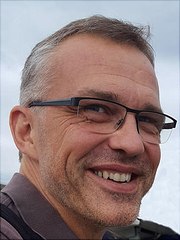Prof. Dr. Konrad Hirschler

Foto: K. Hirschler
Professor
Islamwissenschaft / Exzellenzcluster "Understanding Written Artefacts" (UWA)
Anschrift
Büro
Sprechzeiten
nach Vereinbarung
Kontakt
As a historian of the written word, I specialise in the medieval Middle East between approximately 1100 and 1500. In my research and teaching, the study of written artefacts has increasingly gained importance over the years, particularly in the history of reading and libraries, methodological issues related to documentary sources and archives, as well as the question of provenance. Additional interests include historiography, the Crusades, and the interplay between marginal groups and mainstream society. My work on historiography (such as my first monograph, Medieval Arabic Historiography. Authors as Actors, awarded the Leigh Douglas Memorial Prize) combines social history and literary studies approaches to gain a deeper understanding of how authors and compilers produced historical knowledge. While working on the ways knowledge was produced, I became increasingly intrigued by the other side of the equation, i.e., the history of reading. This research interest led to my second monograph (The Written Word in the Medieval Arabic Lands. A Social and Cultural History of Reading Practices, awarded the British Society for Middle Eastern Studies Book Prize). Becoming increasingly frustrated with the scarcity of documentary sources for the medieval history of reading and books, I was pleasantly surprised when I came across the oldest known Arabic library catalogue (from the thirteenth century). This led me to my British Academy-funded research for my third monograph, Medieval Damascus: Plurality and Diversity in an Arabic Library. The Ashrafiya Library Catalogue (awarded the Best Book on the Medieval Middle East 2017 Book Prize). My book A Monument to Medieval Syrian Book Culture. The Library of Ibn ʿAbd al-Hādī (shortlisted for the British-Kuwait Friendship Association Book Prize and awarded the Middle East Librarians Association Book Price/Honorary Mention) continues along these lines. It deals with the idiosyncratic endowment list by the fifteenth-century scholar Ibn ‘Abd al-Hadi, the most extensive pre-Ottoman endowment record of books. This book focuses very much on the materiality of these (not particularly beautiful) books. My co-authored book (with Said Aljoumani) Owning Books and Preserving Documents in Medieval Jerusalem. The Library of Burhan al-Din al-Nasiri explores the bookshelves and archives of fourteenth-century Jerusalem, and the co-edited volume The Library of Aḥmad Pasha al-Jazzār. Book Culture in Late Ottoman Palestine studies a library in northern Palestine in the late eighteenth century. Research on reading and libraries has been closely linked to the broader question of pre-modern information management, most notably in the transmission of codices (as seen in the co-edited volume Manuscript Notes as Documentary Sources) and medieval archival practices (e.g., the JAOS article From Archive to Archival Practices). As part of this interest, I am leading the ongoing work on the Audition Certificates Platform.
This interest in information management has also focused on the Qubbat al-khazna, a Geniza-style depository of manuscripts and documents in the court yard of the Umayyad Mosque in Damascus, the subject of the co-edited volume The Damascus Fragments. Towards a History of the Qubbat al-khazna Corpus of Manuscripts and Documents and articles on some of its fascinating documents. While working with medieval Syrian manuscripts, it became clear that scribes routinely ‘recycled’ such documents by cutting them into sheets for producing new manuscripts. My articles Document Reuse in Medieval Arabic Manuscripts and Books within Books. The Links between Reuse Fragments and the Qubba al-Khazna summarise the first results. This work on documents and manuscripts has led to an increasing interest in the provenance and translocation of written artefact resulting in articles such as Writing Middle Eastern Agency into the History of the Qubbat al-khazna. The Late Ottoman State and Manuscripts as Historical Artefacts (with Cüneyd Erbay), Saleroom Fiction versus Provenance: Historicising Manuscripts via their Marginal and Material Logic (Schøyen Fragments 1776) and A (Mostly) Local Story: The Translocations of al-Jazzār’s Books in the Nineteenth and Twentieth Centuries. Beyond this work on the production, transmission and translocation of written artefacts, I have increasingly been interested in the interaction between Latin European settlers in the Middle East and the indigenous populations (cf. the edited translation of M. Kohler’s Alliances and Treaties between Frankish and Muslim Rulers in the Middle East. Cross-Cultural Diplomacy in the Period of the Crusades and the article The Jerusalem Conquest of 492/1099 in the Medieval Arabic Historiography of the Crusades). To counterbalance what is, to some extent, an elite history, other publications have addressed the questions of beggary, as well as popular revolt and violence. My books and articles have been translated into European and Middle Eastern languages, including Persian, Italian, Arabic, Turkish and Kurdish.
I welcome proposals from prospective MA and PhD students to work on these topics or other medieval Middle Eastern subjects.
